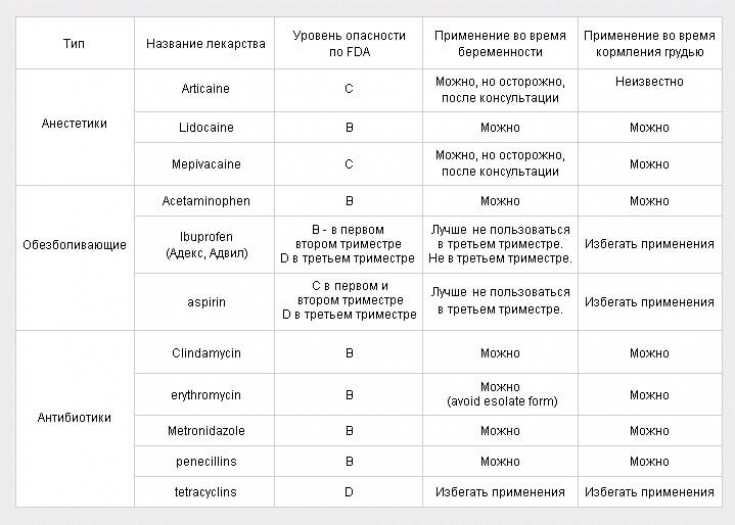In the antenatal clinic, a dental examination of a pregnant woman is not provided. However, an examination by a dentist is required upon registration. Why is this important?
During pregnancy:
- calcium use is increasing;
- an imbalance of trace elements and hormones occurs;
- There is physiological immunosuppression.
As a result, the composition of saliva changes, leading to an increased risk of developing gingivitis, caries and dental plaque.
Find out in the article on estet-portal.com about the main recommendations for the prevention and treatment of diseases teeth and oral cavity during pregnancy.
- Optimal timing of dental care during pregnancy
- Classification of the safety of medicines during pregnancy
- Danger of oral infections during pregnancy
- Prevention of dental diseases during pregnancyand
Optimal timing of dental care during pregnancy
The dangers associated with dental interventions, the use of drugs, stress, depend significantly on the period of pregnancy in which medical attention is needed.
Follow us on Instagram!
The most vulnerable embryo is from day 56 to day 70. Therefore, it is advisable to avoid the use of any medication in the I trimester of pregnancy (and, if possible, in the second phase of the menstrual cycle in women with preserved reproductive function), unless it is dictated by an acute necessity. Each of the planned activities should be evaluated according to the parameter benefit/ricek.
The second trimester is optimal for providing dental or other types of medical care.
Classification of the safety of medicines during pregnancy
In the 1970s, the United States Food and Drug Administration (FDA) created a classification of drugs based on safety during pregnancy:
- A − safe;
- B − conditionally safe;
- C − potentially dangerous;
- D − having a teratogenic or other harmful effect;
- X − contraindicated in pregnant women and women of childbearing age in the second phase of the menstrual cycle.
Botulinum toxin use in oral surgery
Medications that are undesirable for use during pregnancy include well-known glucocorticosteroids, aminoglycosides, ACE inhibitors, immunosuppressants, non-steroidal anti-inflammatory drugs, estrogens, fluoroquinolones, etc.
After 34 weeks it is not recommended to use some non-steroidal anti-inflammatory drugs, in particular indomethacin, due to the risk of antenatal ductus arteriosus closure. In the case of long-term therapy, these drugs can cause pulmonary hypertensionu.

Danger of oral infections during pregnancy
Bacterial infections in the mother lead to chorioamnionitis, which can cause miscarriage, preterm labor, premature rupture of the fetal membrane.
It is advisable to sanitize the oral cavity, eliminate existing foci of infection in order to prevent infection of the fetus.
Dental tissue engineering using stem cells
It is also important to pay attention to calcium and vitamin D.
Without vitamin D, calcium absorption occurs at a level of 10-15%. The content of vitamin D and its metabolites in the mother corresponds to those of the fetus. The explanation is simple: vitamin D easily crosses the transplacental barrier.
During pregnancy, the need for it triples, and if a woman has obesity − even more. Only in 6% of pregnant women the concentration of vitamin D is optimal. The dentist, in order to prevent the pathology of enamel and dentin, the development of caries and tooth sensitivity, may recommend preventive intake of vitamin D.
Adequate calcium and vitamin D reduces the chances of premature birthin.
Gum recession: causes and serious consequences of tooth exposure
Prevention of dental diseases during pregnancy
Dental status worsens during pregnancy.
Pregnancy itself is not the cause of pathology. For example, in the absence of a bacterial irritant, gingivitis in a pregnant woman will not occur. Therefore, before pregnancy planning, it is advisable to carry out sanation.
The task of the dentist during pregnancy − inform the woman.
of caries during this period are standard:
use of fluoride-containing pastes (which are absolutely safe for the fetus);- restricted consumption of sweets.
- If a pregnant woman refuses fluoride pastes, as an alternative it is worth offering
with active mineral supplements. It is important to draw women's attention to the fact that untreated diseases
of periodontal tissuesare among the causes of preterm birth and underweight newborns.

; this is allowed only after consultation with an obstetrician-gynecologist. If the frequency of
herpetic infectionin a patient is more than 6 times a year, it is worth referring her to an immunologist, and on the eve of planned dental interventions − carry out prophylaxis, more actively use antiseptics (for example, hexetidine).
How caries develops: when teeth are in danger Treatment directed at herpes infection is based on the use of
antiviralsand immunomodulators. Because dentists prescribe topical medications, it is recommended that
denotivirbe included in the treatment regimen. The frequency of its application − 2-3 times a day (for comparison: acyclovir − up to 5 times a day), and the therapeutic effect develops faster.
during pregnancy and dental health are closely linked:
enamel hypoplasia often occurs in the presence of a deficiency of vitamins A and D;
pathology of periodontal tissues − with a lack of folic acid;- cheilitis, glossitis, angular stomatitis − in case of low vitamin B2 content;
- increased bleeding gums, tooth loss − with a lack of vitamin C.
- It is also advisable to refuse dental interventions if the patient has
- cold sores and the situation is not urgent.
After all, there is a high risk that as a result of trauma to the oral mucosa and the accompanying stress, generalization of the infection will take place.
Modern approaches to chin correction







Add a comment